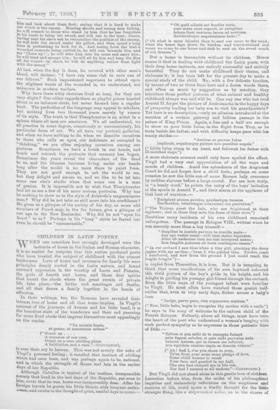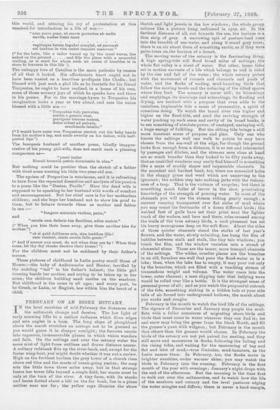CHILDREN IN LATIN POETRY.
WHEN one considers how strongly developed were the inatinebs of home in the Italian and Roman character, it is no matter for surprise that this nation produced poets Who have treated the subject of childhood with the utmost tenderness. Love of home and reverence for family life were principles deeply rooted in the Latin nature, and found outward expression in the worship of Lares and Penates,
the gods of hearth and home, and those dear spirits that haunt the abode where the great events of private life take place,—the births and marriages and deaths, and all that draws a family together in the bonds of affection.
In their writings, too, the Romans have revealed their intense love of home and all that home implies. In Virgil's account of the journeys of Aeneas and his little band, it is the homeless state of the wanderers and their sad yearning for some fixed abode that impress themselves most appealingly on the reader.
"Da moenia fessis,
et genus, et mansuram urbem"
("Grant us . . . .
A mansion of our own,
Grant us a sure abiding place, A habitation and a race."—Coarztarrow), is ever their cry to heaven. This was not merely the echo of Virgil's personal feeling; it recalled that instinct of abiding Which had once been, and was perhaps again to be, national,
and in which the strength of Rome had lain in the earlier days of her Republic.
Although Catullus is typical of the restless, irresponsible society that lived in the last days of the Republic, yet even to him, rover that he was, home was inexpressibly dear. After his foreign travels be greets his little Sirmio with buoyant enthu- siasm, and exults in the thought of quiet, restful days to come:— " Oh quid solutis eat beatius curis, cum mans onus reponit, act peregrino 'abase fessi venimus larem ad nostrum desideratoque acquieseimus lecto I" (" Oh what is more blissful than to east our cares to the wind ; when the heart lays down its burden, and travel-stained and weary we come to our home and sink to rest on the sweet couch of our dreams.") But a home is incomplete without UR children. Hence comes it that in dealing with childhood the Latin poets, with their deep home instincts, are entirely successful and entirely beautiful. They do not make childhood their theme, and elaborate it; it has been left for the present day to make a special study of the child. No; with a few delicate touches, by means of two or three lines here and a dozen words there, and often as much by suggestion as by mention, they introduce those perfect pictures of what natural and healthy childhood always was and will be. Can any one who has read Aeneid II. forget the picture of Andromache in the happy days of prosperity leading her baby son to visit his grandparents P Yet here is no desoriptiou,—only an allusion introduced at the mention of a certain gateway and hidden passage in the palace of King Priam. Again, a line and a half are enough to show us poor little lulus, in the flight from Troy, as he trots beside his father, and with difficulty keeps pace with his manly strides :— "dextrae so parvus lulus sequiturque patrein non passibus aequis."
("Little lulus clung to my band, and followed his father with ill-matched steps.") A more elaborate account could only have spoiled the effect. Virgil had a very real appreciation of all the ways and moods of children. Amid the splendours of the Augustan Court he did not forget how a child feels ; perhaps on some occasion he saw the little sou of some Roman lady overcome by sudden shyness before a large crowd. For see how. truly,
in "a lonely word," he paints the entry of the boys' battalion at the sports in Aeneid V., and their alarm at the applause of that host of warriors :— "Excipiunt p/ausu pavidos, gandentque tuontes Dardanidae, veterumque aduesount era parentum."
("The Trojans greet the lath, who are frightened at their applause; and in them they note the faces of their sires.")
Doubtless many incidents of his own childhood remained unforgotten. The passage in Eclogue VIII., written when he was scarcely more than a boy himself- " Saepibus in nostris parvain to roscida mala-
dux ego vester eram—vidi cum rnatro legentem. Alter ab undecimo tutu me lam acceperat annus ;
Jam fragilis potoram ab terra contingere rams." • ("In our orchard I saw thee when a tiny girl, plucking the dewy apples with my mother—'twas I who guided thee. Twelve years I numbered, and now from the ground I just could reach the fragile boughs ").— is copied from Theooritus, it is true. But it is tempting to think that some recollections of his own boyhood coloured
this vivid .picture of the boy's pride in his height, and his delight in guiding his younger girl friend through the orchard. Even the little ways of the youngest infant were familiar to Virgil. He must often have watched those quaint half- smiles that, even in very early days, flicker across a baby's
face.
".Incipe, parve puer, risu cognoscore matrem" ("Now, little babe, begin to recognise thy mother with a smile") lie says in his song of welcome to the unborn child of the Fourth Eclogue. Fatherly, above all things, must have been the heart of the poet who understood a woman's longing with such perfect sympathy as he expresses in those pathetic lines of Dido :— " Saltem si qua mihi de to suseepta fuisset ante fugam suboles, si quis mihi parvulus aula luderet Aeneas, qui to ta/110/1 ore referret, non oquidom ofnuiuo eapta no deserta videror."
("Ali 1 had I, e'er you chose to rove,
Ta'en from your arms some pledge of love, Some child Aeneas to recall Your face, and gambol in my hall,
The sire had cheered me in the eon, Nor had I seemed BO all undone."—Conmaron.) But Virgil did not stand alone in this gentle love of children.
Lucretius before him, from the midst of his philosophical inquiries and melancholy reflections on the emptiness and sorrows of life, could spare a kindly thought for the little stranger flung, like a shipwrecked sailor, on to the shores of
this world, and uttering his cry of protestation at this unasked-for introduction to a life of woe :— "nam porro puer, ut saeviu proioctus ab undis navita, nudus humi meet vagituque locum lugubri complet, ut aecumst cui tantum in vita sestet transire malorum"
("for the babe, like a sailor tossed up by the cruel waves, lies
naked on the ground and fills the place with a mournful wailing, as is meet for whom such an ocean of troubles is in store to traverse in this life').
The unhappy love of Catullus is the more pathetic by reason of all that it lacked. His affectionate heart ought not to have been wasted on a heartless profligate like Clodia; but blessed with just such a glad life as he foretells for his friend Torquatus, be ought to have realised, in a home of his own, some of those nursery joys of which he speaks here and there in his poems. For in the marriage-hymn to Torquatris his
imagination looks a year or two ahead, and sees the union blessed with a little son :— " Torquatus volo parvulus, matris o greinio Bums, porrigens toneras manus, dulce rideat ad patrern, somihinute labello."
("I would have some wee Torquatus stretch out his baby hands from his mother's lap, and smile sweetly on hi a father, with half- parted lips.")
The bourgeois husband of another poem, blindly inappre- ciative of his young girl-wife, does not merit such a pleasing comparison as- "pueri instar Bimuli tremula patris dormientis in ulna."
But nothing could be prettier than the sketch of a father with tired arms nursing his little two-year-old son.
The egoism of Propertius is wearisome, and it is refreshing to turn from the repeated dissection and analysis of his passion to a poem like the "Desine, Panne." Here the dead wife is supposed to be speaking to her husband with words of comfort and encouragement. But her chief care is for her motherless children; and she begs her husband not to show his grief to them, but to behave towards them as mother and father in one :— "fungero maternis vicibus, pater," and "oscula cum dederie tua ftentibus, adice =Aria."
(" When you kiss their tears away, give them another kiss for mother.") "et si quid doliturus ens, sine tostibus illis cum venient, sleds oscula fallo genie!"
(" And if sorrow you must, do not when they are by 1 When they come, let thy dry cheeks deceive their kisses 1")
For the children must not be saddened by their father's sorrow.
These pictures of childhood in Latin poetry recall those of Homer,—the baby of Andromache and Hector, terrified by the nodding "tail" in his father's helmet; the little girl running beside her mother, and crying to be taken up in her .arms; the children building sand castles on the seashore. But childhood lathe same in all ages; and every poet, be
he Greek, or Latin, or English, has within him the heart of a child.







































 Previous page
Previous page